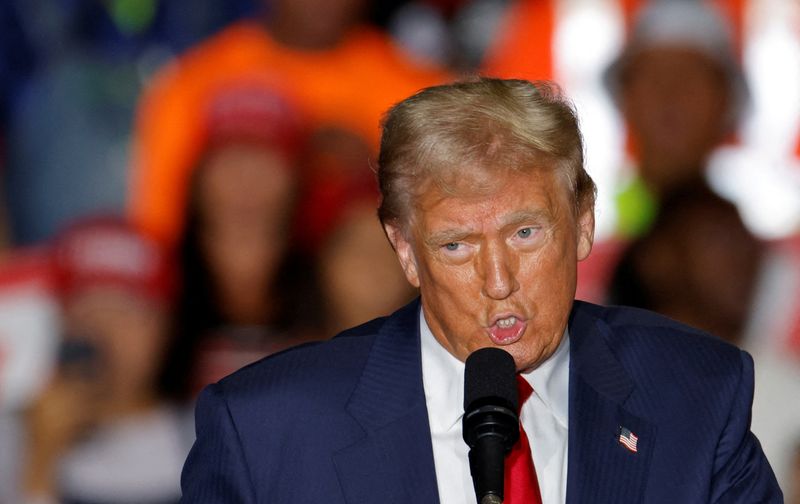By Maria Martinez
WASHINGTON (Reuters) - Germany would be the big loser if a Trump presidency sparked a tit-for-tat trade war between the United States and Europe, with Germany's previously much-envied industrial strength potentially becoming an acute vulnerability.
Republican former president Donald Trump has floated plans for blanket tariffs of 10% to 20% on virtually all imports as well as tariffs of 60% or more on goods from China, in measures he says would boost U.S. manufacturing.
A report by German economic institute IW - provided exclusively to Reuters - found that in a scenario where a Trump administration imposed tariffs of 20% on the EU, and the bloc retaliated in kind, euro zone GDP would slump 1.3% in 2027 and 2028 and fall as much as 1.5% in Germany.
The negative effects on EU GDP increase from 2025 to 2028, while the effects on U.S. GDP are stronger in the first two years, with a GDP decline of 1.3% with tariffs of 10% and 1.5% with tariffs of 20% in 2025, the study found.
The effects on U.S. GDP decrease over time due to U.S. imports declining more than exports in the scenario, delivering an increasingly positive effect on the U.S. trade balance.
Germany, Europe’s biggest economy, will this year be the only G7 country failing to grow for two consecutive years, according to the latest forecast by the International Monetary Fund. A trade conflict with the U.S., its main trading partner, would deliver a big hit to output.
"If you take the view that I do, that the stimulus in China is going to be a disappointment, then Germany isn't going to be bailed out by a restoration of growth in China,” Jacob Funk Kirkegaard, senior fellow at Bruegel and the Peterson Institute for International Economics, told Reuters.
“And if the U.S. turns even more protectionist, the short term sources of growth for Germany are very few,” Kirkegaard said.
The U.S. overtook China as Germany’s biggest trading partner this year, after eight straight years of China being at number one.
"Half of Germany's growth always comes from exports and if you look at what's going on in the world, you have to say that this pillar is under attack," German Economy Minister Robert Habeck said earlier in October when presenting the government's economic forecasts.
NEW INDUSTRY BLOW
German exports contracted by 0.3% in 2023 due to weak global demand and geopolitical tensions. The government expects a 0.1% contraction this year.
A study by the Hans Boeckler Foundation macroeconomic institute shows that 20% tariffs could shave one percentage point off output in Germany in the first two years of implementation.
German exports to China could decline by almost 9.6% overall if there was a trade war between the U.S. and China, according to an Ifo Institute study.
The Ifo study shows that German exports to the U.S. could fall by 14.9%, in a scenario where the U.S. imposed tariffs of 60% on goods from China and 20% on goods from other countries.
German car exports would be particularly hard hit, down 32%, as would pharmaceutical exports, down 35%, Ifo said.
This would be a fresh blow for German industry - another pillar of Germany’s economic model - which has been in a downturn for years with no recovery in sight.
“Proposed tariffs on international goods could hit the manufacturing sector hard, deepening the struggles of an already fragile industrial base,” said Neil Devaney, partner and co-Head of Weil’s London Restructuring practice.

Even with tariffs of just 10%, the German economy would suffer partly due to the uncertainty they create, said Juergen Matthes, head of international economic policy at IW.
“One of the main problems with the economy right now is the weakness in investment and also the reluctance to consume, because people have that feeling of uncertainty,” Matthes told Reuters.